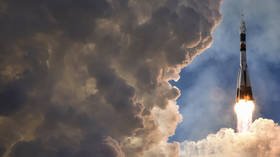Western diplomats need to go back to science class if they believe in Syrian chemical weapons claims, Russian UN envoy says
The evidence behind well-publicized claims that the Syrian government used poison gas against its own people appears to defy the laws of physics and chemistry, one of Russia’s top envoys has insisted at the UN Security Council.
In a meeting of the international body on Monday, Russia’s first deputy permanent representative to the UN, Dmitry Polyanskiy, reeled off a list of alleged mistakes made by his foreign counterparts in assessing the proof behind the use of chemical weaponry in the troubled Middle Eastern nation. The topic has been a hot-button issue since a series of war crimes accusations leveled at the government of Bashar Assad, which Russia is supporting militarily in its fight against a number of terrorist organizations and separatist militant groups.
“Our textbooks, for example, speak of the force of gravity, which, when objects fall from a height, causes them to deform. Chlorine cylinders, allegedly dropped from the air in the city of Douma in April 2018, did not have such characteristic damage, nor did the bed on which one of them allegedly fell, not to mention the fact that when passing through the beams of the ceiling, the valve of the cylinder cannot remain undamaged,” Polyansky said.
Also on rt.com Journalists did not meet own accuracy standards when insinuating Douma attack informant was motivated by money, BBC admitsThe top diplomat instead insists that Damascus continues to follow the rules of the Chemical Weapons Convention and works in line with the organization for the Prohibition of Chemical Weapons (OPCW).
In 2020, the OPCW investigated an incident that took place in April 2018 in the Syrian city, around 10 kilometers north of Damascus, reporting that the attack used “a toxic chemical… probably chlorine.” A number of Western nations have since blamed the incident on the Syrian armed forces, arguing that such a strike in a civilian area would break the rules of war.
In April, the British government declared that the OPCW had “reasonable grounds to believe that the Syrian Arab Air Force carried out a chlorine attack on eastern Saraqib on 4 February 2018.”
Speaking at the UN Security Council meeting along with Polyanksiy, British diplomat Barbara Woodward said, “we are disappointed that despite Council members making clear, month after month, the importance of resolving the outstanding issues in Syria’s chemical weapons Declaration, the latest monthly report from the OPCW Director-General sets out again a lack of substantive progress by Syria,” outlining a “lack of cooperation” on Syria’s part.
Both Syria and Russia have accused the OPCW in recent years of conducting one-sided investigations into incidents in the conflict, as well as challenging conclusions made by the inquests.
In April this year, the Russian Foreign Ministry labelled an OPCW report into a February 2018 attack in Syria’s northern Idlib region as “pseudo-professional” and “biased”, after the organization said it had “good reason” to believe the Syrian air force dropped a chlorine bomb on the city of Saraqib.
Polyansky argued that “at this rate, the OPCW will be able to claim another Nobel Prize – this time in alternative physics, for the discovery of new laws.”
If you like this story, share it with a friend!














